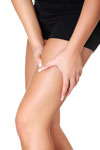 Leg cramps are a common health complaint. Diagnosing a leg cramp can be tricky, however. Finding the exact cause often proves illusive. Of course, the odd leg cramp can be endured without much suffering. But for those experiencing frequent cramping, the pain can be intense and sometimes even excruciating. Frequent leg cramps can also be quite disruptive to your sleep.
Leg cramps are a common health complaint. Diagnosing a leg cramp can be tricky, however. Finding the exact cause often proves illusive. Of course, the odd leg cramp can be endured without much suffering. But for those experiencing frequent cramping, the pain can be intense and sometimes even excruciating. Frequent leg cramps can also be quite disruptive to your sleep.
The good news is that there are a number of treatments you can try to rid yourself of nighttime leg cramping. The best alternative health advice is to make sure you’re getting enough calcium and/or magnesium — these are the most common risk factors for leg cramps. Low levels of potassium also could also be a culprit.
Another potential cause of leg cramps may be a deficiency in hesperidin. Hesperidin is a bioflavonoid that is sometimes referred to as “vitamin P.” Some medical research suggests that hesperidin, along with other bioflavonoids like citrin, rutin, flavones, flavonals, catechin and quercetin, may be able to help prevent night leg cramps.
In one clinical trial performed in Italy, researchers set out to investigate the preventive action of “Pycnogenol” on cramps and muscular pain in different groups of subjects and patients. Pycnogenol is a brand name for a combination of bioflavonoids obtained from the bark of the “Pinus maritima” pine tree that are known for their antioxidant properties.
The study included a five-week observation period (four weeks of treatment and one follow-up week after the suspension of treatment) to evaluate the effectiveness of Pycnogenol. Four 50-milligram (mg) capsules (total dose 200 mg/day) were prescribed with a suggestion to drink at least 1.5 liters of water every day.
In the first part of the study, 66 healthy subjects completed a five-week follow-up period. The research team found that the difference between the number of cramp attacks recorded within the two weeks before inclusion in the study and the number of episodes during the fourth and fifth weeks were statistically significant. In normal subjects the average number of episodes was reduced from 4.8 events per week to 1.3 at four weeks. In patients with vein issues, the decrease in cramping went from 6.3 to 2.6 per week. In athletes, the number of episodes decreased from 8.6 to 2.4. The decrease was still present at five weeks in the three groups, to levels significantly lower than at the start of the study.
For another great health tip and natural remedy for curing leg cramps, read the article This Fruit Could Take the Bite Out of Leg Cramps.
